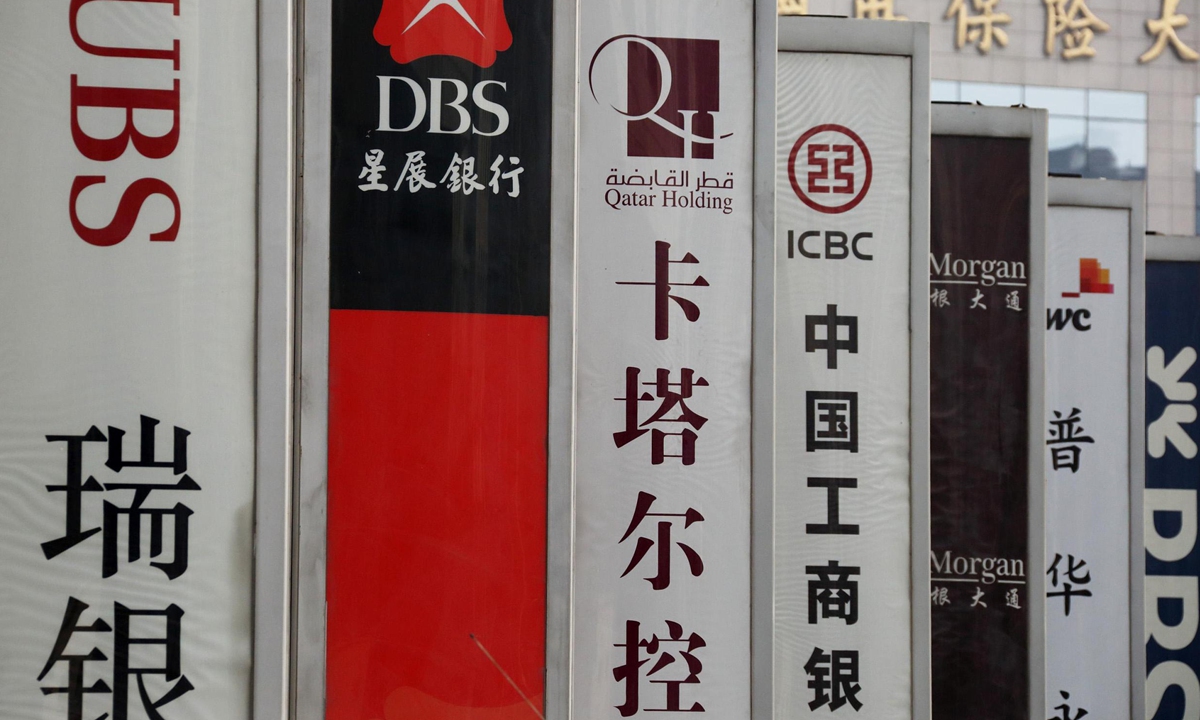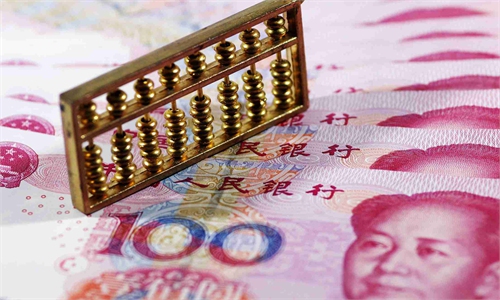
The skyline of Lujiazui in Shanghai Photo: CFP
Editor's Note:
Despite a complex and grim international environment, foreign financial institutions continued to briskly increase their investment in China in 2023, eyeing huge dividends brought about by the country's long term stable growth. At the critical moment for promoting high-quality growth, a key meeting in late October charted a path of financial development with Chinese characteristics to build the country into a financial powerhouse. Industry insiders and experts said building a strong financial sector is essential to achieving Chinese modernization, which will provide greater opportunities to foreign and domestic financial institutions and better contribute to the country's high-quality growth. This article is one of a series looking back at China's economic work this year and sheds light on materializing the vision of building a financial powerhouse.
In 2023, the high-quality development of China's financial sector achieved notable progress. Many foreign financial institutions have doubled down their investment in China amid the country's continued two-way financial opening-up, while authorities have conducted a series of reforms to improve the competitiveness of the country's financial industry so that it can play a bigger role in serving the economic and social development.
Industry insiders and experts said China needs to further promote the internationalization of the yuan and continue to expand financial opening-up in order to strengthen the country's financial sector, which will create greater opportunities for domestic and global financial institutions.
Continuous capital inflow
Standard Chartered Securities (China) Limited (SCSCL) announced on December 11 that it has been granted the license to commence securities business by the China Securities Regulatory Commission (CSRC). Received a set-up approval in January 2023, it is the first newly established wholly foreign-owned securities firm in China after the scrap of foreign ownership restrictions for financial institutions in the onshore market in 2020.
"We look forward to the continued opening of financial markets in China, where capital markets will be increasingly attractive to global investors and financial institutions," John Tan, chairman of SCSCL, was quoted as saying in a press release sent to the Global Times, while expressing strong confidence in the company's future development in the Chinese market.
In recent years, China has been steadily promoting high-level opening-up in the financial sector, with more than 50 measures introduced, including allowing international investors to invest in the country's capital market via more channels and lifting ownership caps for foreign institutions for securities, futures and funds.
Thanks to China's concrete opening-up steps, many global financial institutions have stepped up their presence in the Chinese market this year. In October, HSBC Bank (China) Company Limited announced to acquire Citi's retail wealth management portfolio in the Chinese mainland. In November, US payment company Mastercard's Chinese joint venture obtained approval to conduct bank card clearing operations.
"We believe there is still considerable potential for China's growth in the global capital market, largely hinging on the openness of the Chinese capital market," Patrick Liu, Asia Pacific President of New York-based Neuberger Berman Group, told the Global Times in a recent interview.
As China persistently advances opening-up and innovatively restructures its capital market, we anticipate a steady inflow of overseas capital, he said.

File photo:VCG
Stepped-up reforms
Since the beginning of 2023, China has rolled out a series of reform and opening-up measures in the financial sector. Of milestone significance in the reform of China's capital market, China rolled out its across-the-board registration-based IPO system in February. The development of the Beijing Stock Exchange entered a fast lane of development amid the country's ramped-up efforts to strengthen financial support for technological innovations.
The National Administration of Financial Regulation was officially set up on May 18, marking an important step in the country's institutional reform on financial supervision.
The Central Financial Work Conference held in Beijing in late October stressed that the financial sector is the lifeblood of a nation's economy and a crucial component of a country's core competitiveness, urging to accelerate the building of a nation with a strong financial sector.
The goal of building a financial powerhouse comes just in time, as the visionary strategy serves as a stabilizer for preventing financial risks and maintaining financial security amid current economic environment, experts said, noting that the financial sector is playing an increasingly important role in supporting the real economy.
"By comparing the financial sector to the 'lifeblood of a nation's economy,' it shows that policymakers' understanding of the nature of finance has entered a new stage," Dong Yun, director of the Research Center for International Political Economics of the National Institution for Finance and Development, told the Global Times.
With people-centered value orientation, serving the real economy as the fundamental mission and risk prevention as the eternal theme, we can see that China's pursuit of financial strength emphasizes serving the goal of achieving Chinese modernization and national rejuvenation, Dong said.
Stable economic development is the basis for the prosperity of the financial sector, while, on the other hand, the importance of the financial sector for the economic and social development is irreplaceable, Dong said.
Over 40-plus years of reform and opening-up, China's financial market has been much larger along with the economic growth, with the added value of the financial sector accounting for around 8 percent of its GDP - equivalent to the US. The asset volume of the country's banking institutions has become No.1 globally, while the scale of its equity, bonds and insurance market is the second-largest in the world, Wen Bin, chief economist with China Minsheng Bank, told the Global Times.
However, compared with developed countries, the international competitiveness and discourse power of China's financial sector does not match its status as the world's second-largest economy, Wen said, noting that there is great potential for high-quality development of the country's financial sector.
Financial powerhouse
Following the Central Financial Work Conference, the country's financial regulatory bodies have taken actions and measures to implement related work arrangements to better serve the real economy and meet the needs of the economic and social development.
Yi Huiman, chairman of the CSRC, pledged efforts to expedite building a safe, standardized, transparent, open, dynamic and resilient capital market. Efforts will be made to improve the registration-based IPO system and the multi-level capital market system, raise the quality of listed companies, and advance high-level institutional opening up, he said, the Xinhua News Agency reported.
We should boost the high-quality development of the financial sector by smoothening the channels for guiding capitals to the real economy, increasing fund utilization efficiency, and effectively prevent financial risks so as to continue to meet the needs for financial services in the economic and social development and the people's increasing needs for such services, Dong said.
In order to strengthen the country's financial sector, we should step up efforts to boost high-level opening-up in the financial sector and ensure national economic and financial security, Wu Xiaoqiu, dean of the China Capital Market Research Institute, wrote in an article in the Party-linked newspaper the Study Times on December 15.
An international financial industry in China is featured by the internationalization of the yuan as well as the opening-up and internationalization of the capital market, Wu said. He stressed efforts to provide high-quality financial services, expand high-level financial opening-up, provide quality services for "go global" strategy and the Belt and Road Initiative, and steadily and cautiously push forward the internationalization of the yuan.
In addition to improving external environment to create sound conditions for the internationalization of the yuan, we should strengthen the yuan's role in international financing, support the development of overseas foreign exchange market for trading yuan and smooth global circulation of the currency, Wu said.
"In addition, efforts are needed to deepen financial market reforms, improve market-based interest rate system, accelerate the development of the capital market, and boost financial infrastructure construction so as to give into better play the basic function of financial resource allocation," Wen said. He said comprehensive financial supervision is also necessary to effectively contain financial risks and safeguard financial security.
On the basis of ensuring financial and economic security, we should continue to expand high-level financial opening-up, Wen said, pointing to efforts to gear domestic regulations to international practices, build a world-class, law-based and market-oriented business environment, and steadily boost the yuan's internationalization.
"China is one of our strategic markets in the world, and we are optimistic about China's development in the long term," Helen Huang, managing director for China of the world's leading asset management company Fidelity International, told the Global Times in a recent interview.
In the face of global uncertainties, the Chinese market is a good place to diversify portfolio and explore value, as China's macro-economic fundamentals are more stable and more resilient to deal with external challenges, Huang said.


